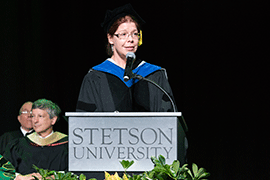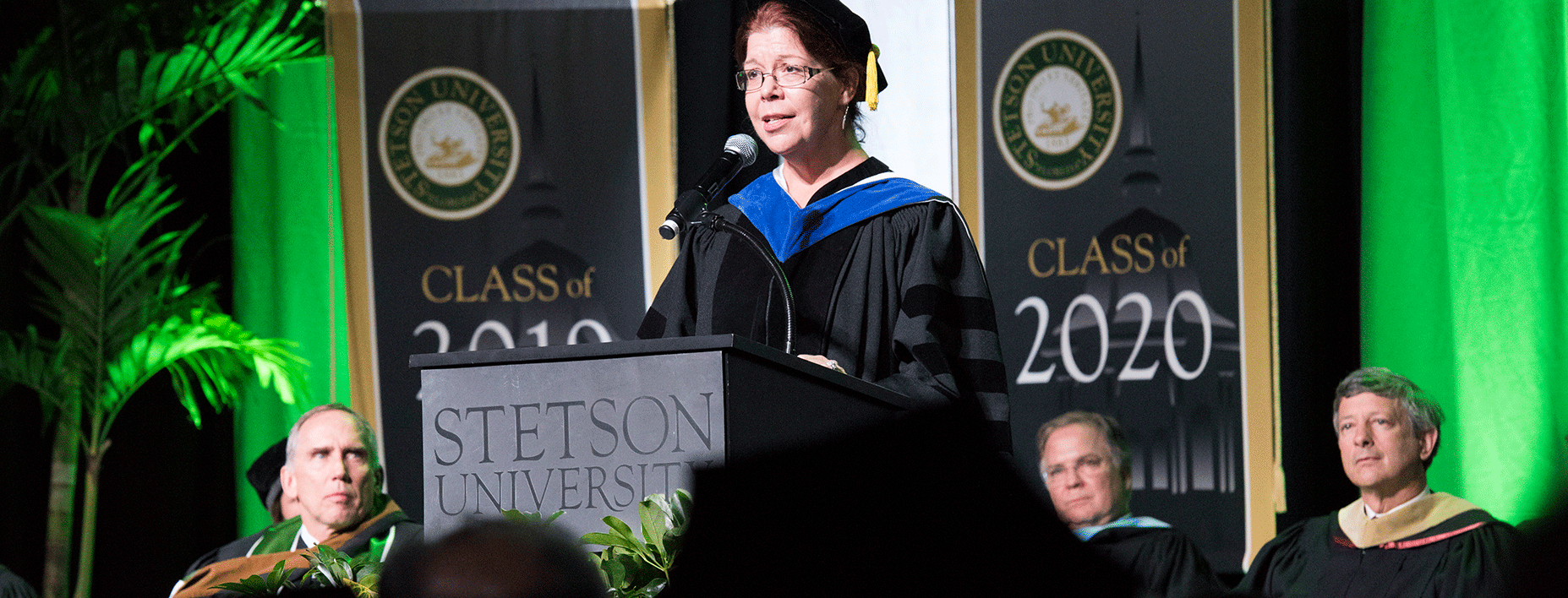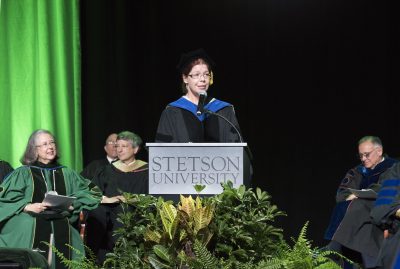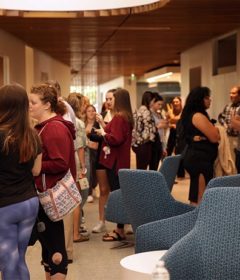In Her Own Words: McEniry Award winner Megan O’Neill, Ph.D.

Thank you, Provost (Noel) Painter, and let me say again what a surprise it was to be the recipient of the McEniry Award. When we have only a few awards for outstanding teaching, it is an honor and a privilege to be the chosen one.
Thanks for coming to Convocation; these important markers of ceremony and ritual act to bond us as a family. Convocation and commencement bond us as a Stetson family. These days, the bonds of family are particularly in our minds. Some families are suffering separation and loss. Some families, some of them right here, willingly change as individual lives go forward. Some members of our families —whether they’re our chosen families or our birth families or the big human family — challenge us and our beliefs. How can we strengthen these families of choice, of practice, these families grounded in values and right behavior? How will we manage differences when differences are both essential and taxing?

What I know for sure is that the greater good for the human family demands that when we encounter differences, we listen. It’s easy, these days, to shout or to shut up in the face of shouting. It’s often easier to withdraw or to listen in resignation, without really hearing. Living in the bubble, in our own echo chamber, is safe. It’s simpler by far to avoid conversations that carry the risk of learning about someone else’s opinions and reasoning.
Because learning about someone else — learning in general — CAN be risky. I don’t mean “risk” as in “danger.” I mean “risk” as in “chance to learn.” To suddenly realize that something you’ve “known” for years is not true can shake the ground under your feet. To meet people whose life experiences are radically different risks your learning a new perspective. And this is a life-long process, you know, much longer than your years at Stetson.
 In my courses at Stetson, I teach, but I also learn. And so will you. Hopefully you seniors have taken your opportunity to learn as much as you can in this precious period of years. When you seek out conversations and situations and people that challenge you, you risk learning more about yourself. When you ask questions, you risk learning more about others. When you listen not for your turn to speak but with actual human curiosity about what someone else thinks, you risk expanding your mind.
In my courses at Stetson, I teach, but I also learn. And so will you. Hopefully you seniors have taken your opportunity to learn as much as you can in this precious period of years. When you seek out conversations and situations and people that challenge you, you risk learning more about yourself. When you ask questions, you risk learning more about others. When you listen not for your turn to speak but with actual human curiosity about what someone else thinks, you risk expanding your mind.
These are good, solid, sound risks. You should take them. Ahead of you lie some marvelous experiences and some depressing ones. How you respond to those experiences will test your bonds to what you believe to be true and real. But you won’t get anywhere at this place, or in life really, without listening to understand.
Some of us think of the classroom learning experience as one that involves lectures, note taking, reading and highlighting. All that is true, but that’s an incomplete picture, and it’s also pretty passive. You take in information and put it back out there, sometimes to be graded. But what if you thought about the learning experience at college as the process of asking questions and considering multiple answers? What if you thought the goal of your precious time here was to be a better human being, a healthy member of your human family, a human who makes choices based on a rich and deep range of inputs that have tested you and your assumptions? Some of your courses won’t focus on these goals explicitly, but you always have the choice to reach for that learning and make of it what you can.
 Last year, I had a singular learning experience. One of my students simply wasn’t learning what I was teaching. I used every teaching technique I know, and after 30 years in the classroom I know a lot of techniques. I’d see her notebook and she’d have simply rewritten all the information. Some pages were illustrated with pink stars, blue lines, orange arrows and frowny faces. She got horrible test scores and only slightly better essay grades. She was frustrated. I was frustrated. I could not teach her. She could not learn from me. I felt inept. She felt stupid. It was awful for both of us. I asked colleagues and friends for guidance to no avail, until I finally slapped myself on the forehead and asked HER. When we began to ask questions of each other, listening to understand the other’s answers, we started to solve the issues. Not only did we find common ground, we found ways to communicate more effectively. Her grades started going up. And at the end of the semester she and I had bonded, not over the course material but because we had chosen to risk listening to each other like human beings. She’s a member of my human family now, wherever she goes.
Last year, I had a singular learning experience. One of my students simply wasn’t learning what I was teaching. I used every teaching technique I know, and after 30 years in the classroom I know a lot of techniques. I’d see her notebook and she’d have simply rewritten all the information. Some pages were illustrated with pink stars, blue lines, orange arrows and frowny faces. She got horrible test scores and only slightly better essay grades. She was frustrated. I was frustrated. I could not teach her. She could not learn from me. I felt inept. She felt stupid. It was awful for both of us. I asked colleagues and friends for guidance to no avail, until I finally slapped myself on the forehead and asked HER. When we began to ask questions of each other, listening to understand the other’s answers, we started to solve the issues. Not only did we find common ground, we found ways to communicate more effectively. Her grades started going up. And at the end of the semester she and I had bonded, not over the course material but because we had chosen to risk listening to each other like human beings. She’s a member of my human family now, wherever she goes.
We could have chosen to trudge along in our accustomed paths, silently shutting each other out instead of tackling hard issues. Instead, both of us recognized that we had choices. Avoiding the hard conversations doesn’t serve the greater good.
You know what does? You do. Every one of us in this room can serve our human family by simply listening. By challenging ourselves to ask questions, to listen for understanding, to find common ground rather than reiterating endless division and deciding not to avoid tough conversations.
These are challenges worth taking. They are risks worth taking. We risk finding that we are not as bonded as we thought, or that our families of choice are full of weak links. And that’s fine. Many families are. The question we will always face is, what can we learn from taking those risks? And the answer is, a LOT.
You are here to learn. As we all are. This year, let us resolve to listen as well.
Thank you.
-Megan O’Neill, Ph.D., is director of The Writing Program and Jane Heman Language professor in the Department of English. She was selected for the 2018 William Hugh McEniry Award for Excellence in Teaching, considered Stetson’s most prestigious faculty award.



